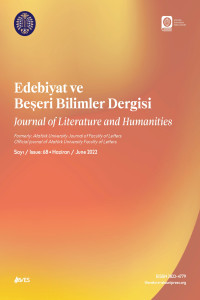Someone Wrong or Someone Divine: A Comparative Study of the Concept of Poetry and Rhapsode In Hesiod’s Theogony and Plato`s Ion / Hatalı Olan mı, Kutsal Olan mı?: Hesiod'un Theogony ve Plato'nun Ion Adlı Yapıtlarında Şiir ve Ozan Kavramımın Karşılaştırmalı Bir Çalışması
Ö Z E TEdebiyatın en eski biçimlerinden bir tanesi olan şiirin antik şair Hesiod ve düşünürPlaton’a göre bazı farklı kuramsal boyutları vardır. Hesiod döneminde (çoğu zamanşarkı ya da ilahi biçiminde olan) şiir esin perilerince verilen kutsal bir armağan,şairin yaratıcılığı ise kendisinin tanrılarla olan dolaysız iletişiminin sonucu olarakgörülür. Öte yandan Platon, akla değil de hislere hitap eden zararlı ve tehlikeli birtür olarak değerlendirir. Bu yüzden Platon şairleri de esin ile mantık dışı birbiçimde yazan ve bu esinin sonucunda yaratıcılıktan, gerçeklikten ve dehadan uzakkimseler olarak tanımlar. Dolayısı ile Platon, Hesiod’un aksine bilgi, erdem ve akladayanmayan şiirin hiçbir zaman nihai gerçekliğe ulaşamayacağını; yalnızcaeleştirel düşünceye, diyalektik sorgulamaya ve düşünsel incelemelere dayananfelsefenin gerçekliği tartışabileceğini savunur. Bu bakımdan bu çalışma Hesiod’unTheogony ve Platon’un Ion adlı yapıtlarında sözü edilen farklı şiir ve şair imgelerinitartışacaktır.Anahtar Kelimeler: Platon, Hesiod, Ion, Theogony, Şiir, OzanAB S T R AC TAs one of the oldest forms of literature, the concept of poetry has some theoreticaldimensions from the points of ancient poet Hesiod and philosopher Plato. In thetime of Hesiod, poetry (song or hymn), was considered a sacred gift coming fromthe Muses, and the creativeness of the poet (the rhapsode) coming from the poet`sdirect relationship with the gods. Plato on the other hand sees poetry as harmfuland dangerous addressing to the senses, not the rational mind. Thus, Plato regardspoets as inspired and irrational, and because of this inspiration he considers poetsto be separate from creativity, reality and genius. Hence unlike Hesiod, Plato claimsthat poetry, which is not based on knowledge, wisdom and reason, cannot reachthe ultimate truth; only philosophy can discuss reality through critical thinking,dialectical inquiry and philosophically analysis and not by inspiration as a gift fromthe Muses. This article will discuss Hesiod’s concept of poetry in Theogony andthat of Plato’s in Ion.Keywords: Plato, Hesiod, Ion, The Theogony, Poetry, Rhapsode
___
- Bloom, Allan. The Roots of Political Philosophy: Ten Forgotten Socratic Dialogues. New York: Cornell University Press. 1987.
- Dorter, Kenneth. “The Ion: Plato’s Characterization of Art.” Aesthetics and Art Criticism 32. 1 (Autumn, 1973): 65-78.
- Gillet, Suzanne Stern. “On (Mis)interpreting Plato's "Ion".” Phronesis 49. 2 (2004): 169- 201.
- Greene, Mott T. Natural Knowledge in Preclassical Antiquity. New York: The Johns Hopkins University Press. 1992.
- Greene, William Chase. “Plato’s View of Poetry.” Harvard Studies in Classical Philology 29 (1918): 1-75.
- Habib, Rafey. A History of Literary Criticism: From Plato to the Present. Cornwall: Blackwell. 2005.
- Hargis, Donald E. “Socrates and the Rhapsode: Plato's Ion.” Studies in Interpretation Vol 2. eds. Doyle, Esther M. and Virginia Hastings Floyd (Amsterdam: Rodopi, 1977), 1- 13.
- Yayın Aralığı: Yılda 2 Sayı
- Başlangıç: 1970
- Yayıncı: Atatürk Üniversitesi
